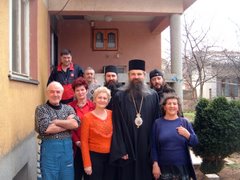Russia and West Far Apart Concerning Kosovo
Russia and West divided on UN Kosovo plan
REUTERS, Fri Jan 26, 2007 9:22 AM ET
By Matt Robinson
VIENNA (Reuters) - Russia is skeptical about a plan by United Nations envoy Martti Ahtisaari that would give Serbia's breakaway province of Kosovo virtual independence, a senior diplomat told Reuters on Friday. After a meeting in Vienna with the six-member Contact Group of major powers, the diplomat said Russia had urged a delay in any U.N. decision on Kosovo until Serbia had formed a new government following an inconclusive parliamentary election on Jan 21.
"It was a very tough meeting. The Russians are very skeptical about the plan," the diplomat said on condition of anonymity. "I have never seen the Quint (United States, Britain, France, Germany and Italy) more united."
Ahtisaari's spokesman Remi Dourlot told reporters after the meeting the envoy would travel to Belgrade and Pristina as planned on February 2 to present his proposal to officials.
The Contact Group has set policy on Kosovo since the U.N. took control in 1999 of the province where 90 percent of the population is ethnic Albanian. Ahtisaari drafted his plan after a year of shuttle diplomacy and fruitless Serb-Albanian talks.
Diplomatic sources said the Vienna meeting was the last step before he presents his proposal to officials next Friday. He will hold further bilateral talks in coming weeks, but diplomats say that would be merely fine-tuning details of the plan.
Eight years after NATO drove out Serb forces accused of ethnic cleansing in Kosovo while fighting Albanian separatists, Kosovo's Albanians demand nothing less than full independence.
Their patience was tested in November, when the Contact Group told Ahtisaari to delay until after Serbia's election.
"There is no need for another delay," Kosovo Prime Minister Agim Ceku told reporters in Pristina on Friday. "The Contact Group assured us before that there wouldn't be another delay."
Belgrade is offering only far-reaching autonomy for a territory it sees as the sacred cradle of the Serb nation.
Diplomatic sources told Reuters this week Ahtisaari's plan would set Kosovo on the road to independence with international supervision, giving it the right to apply for membership of international organizations.
It would provide for a right to dual citizenship and urge Pristina to establish good relations with Serbia, but contain no reference to Serbian sovereignty.
LONG COALITION TALKS
Russia's insistence on waiting for a new government in Belgrade could mean a delay of weeks or months. Last weekend's national election in Serbia failed to produce a clear majority and parties were preparing for lengthy coalition talks.
The ultranationalist Radical Party won 28 percent of the vote but could find no partner that would give it a majority.
The pro-Western Democratic Party came second and is looking for a deal with the party of moderate nationalist Prime Minister Vojislav Kostunica and a smaller liberal party.
Kostunica used increasingly hardline rhetoric during his campaign and has said a common stance on Kosovo is the key to a coalition deal. It is not clear how easy it will be for him to agree with the Democrats on how to handle the potential loss of the province.
Parties have until late May to agree on a coalition, or a fresh election would have to be called.
After a meeting in Brussels, NATO, which keeps 16,000-plus peacekeepers in the province, also advised against a delay.
"There was a strong sense around the table on the need for a (U.N.) resolution as soon as possible," NATO spokesman James Appathurai told reporters. "Long delays risk a lack of clarity, risk fostering instability," he added.
The alliance is on alert for ethnic tensions caused by the report and wants to ensure it is not caught napping by any new violence in Kosovo, as it was in March 2004 during two days of rioting by ethnic Albanian mobs.

















